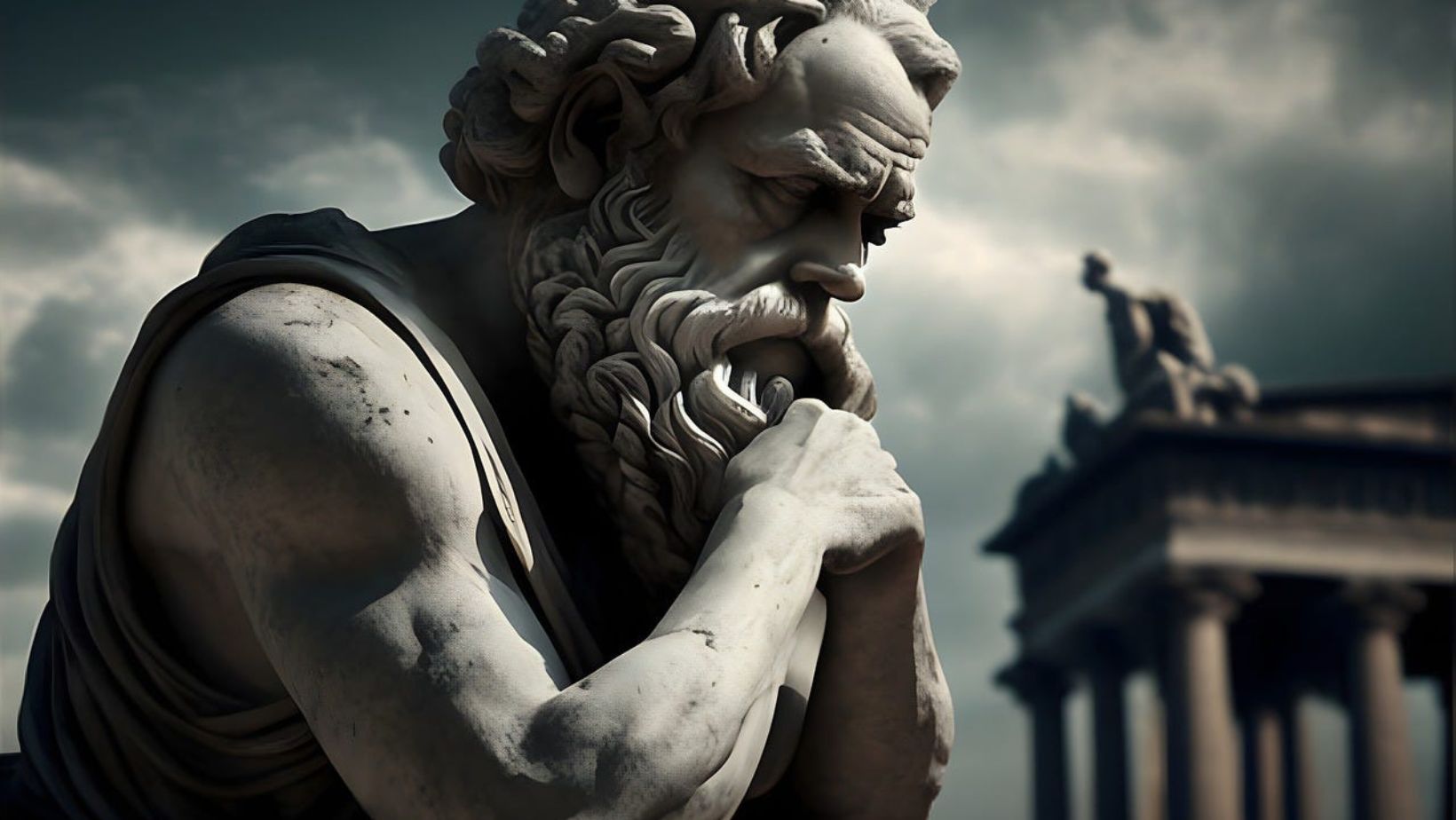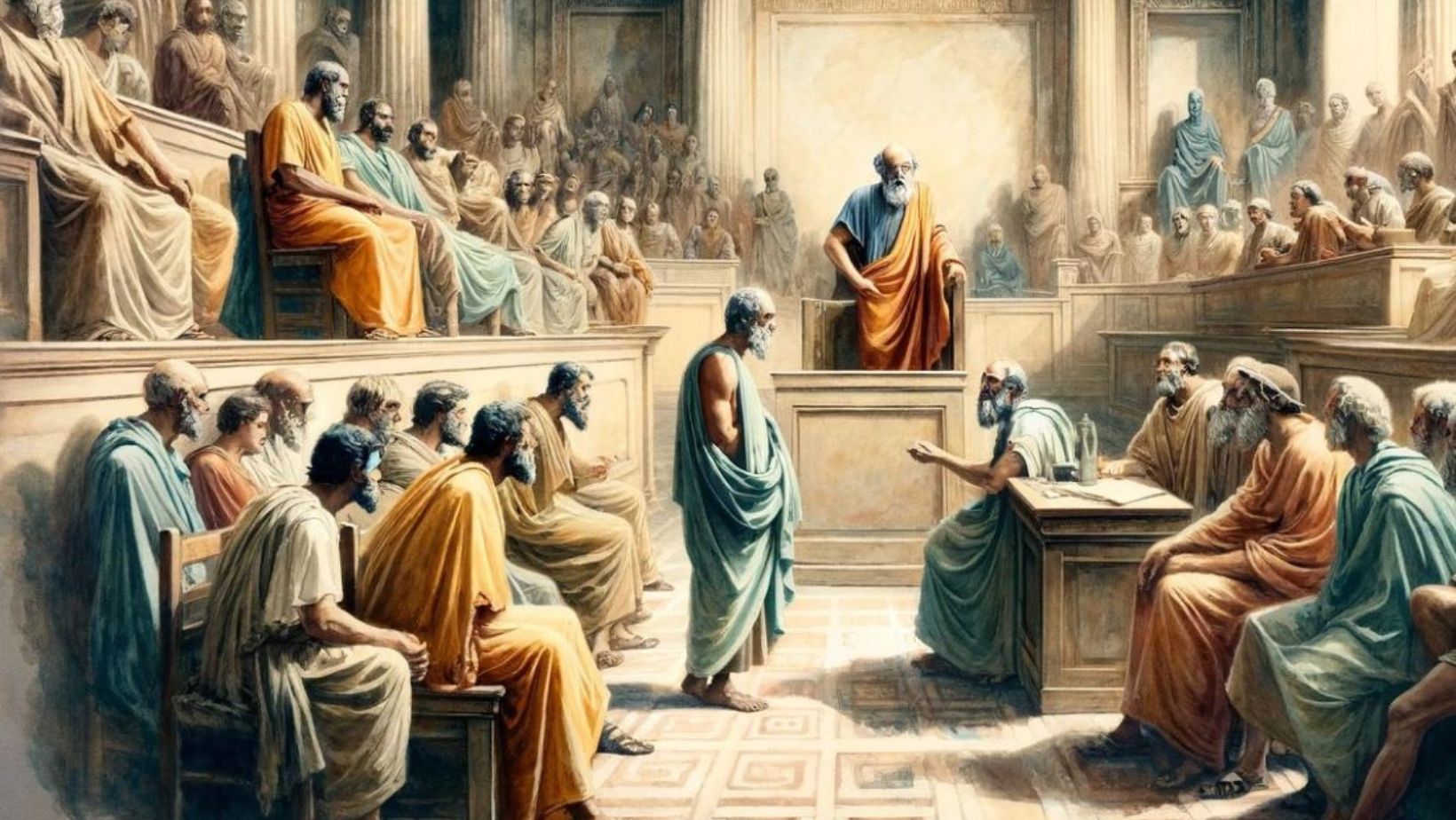Ever wondered why some ancient philosophies still echo through time, shaping thoughts and debates centuries later? At the heart of such enduring wisdom are Socrates beliefs, which have captivated thinkers, writers, and seekers of truth across generations. Digging into history isn’t just a dive into the past; it’s more like opening up new chapters about ourselves that we’re only starting to get curious about. From his views on an examined life to his ideas on virtue being knowledge, let’s embark on a journey back to Ancient Greece – no time machine needed.
Table of Contents:
- Who Was Socrates?
- Socrates’ Philosophical Beliefs and Methods
- Socrates’ Trial and Death
- The Legacy of Socrates
- Conclusion
Who Was Socrates?

Socrates (469 BC–399 BC) was a classical Greek Athenian philosopher.
Many would say Socrates is the founder of Western philosophy.
Early Life and Career: Socrates Beliefs
Socrates was born in Athens in 469 BC to a stonemason named Sophroniscus and a midwife named Phaenarete.
Although his family was not wealthy, they were by no means poor. Socrates could not claim noble birth like Plato, but he grew up comfortably in the deme of Alopece.
As a young man, Socrates received a basic Greek education. He learned the skills of reading, writing, music, poetry, and physical education.
Socrates followed in his father’s footsteps as a stonemason, but his true passion lay elsewhere. He spent his days in the agora, the Athenian marketplace, conversing with anyone who would listen.
Socrates sought to use philosophy as a way to discover how we should live if we were to be truly fulfilled and successful human beings.
Despite his humble origins, Socrates quickly gained a following among the rich young aristocrats of Athens, including a young Plato.
They delighted in watching him question the city’s most powerful and influential men.
The Socratic Problem: the Philosophical Socrates
The Socratic Problem refers to the difficulty of finding the “real” Socrates.
Socrates himself never wrote anything down. What we know of him comes primarily from the writings of his students, particularly Plato and Xenophon.
However, these accounts often contradict each other. They also mix historical details with literary invention.
As a result, it’s hard to separate fact from fiction about Socrates’s life and thought.
Plato’s Socrates is the most well-known, but he’s arguably the least historical. In Plato’s later dialogues, Socrates often serves as a mouthpiece for Plato’s own philosophical views.
Xenophon admired Socrates’ intellect and moral character.
The comic playwright Aristophanes parodied Socrates in his play The Clouds. His Socrates is a ridiculous figure who makes absurd arguments.
Aristotle, born 15 years after Socrates’ death, helps bridge the gap between the historical and literary Socrates. He treats Socrates as a real philosopher rather than a legendary figure.
Ultimately, reconstructing the true Socrates is impossible. What we have are glimpses and interpretations from various sources.
Despite the challenges, Socrates’s legacy is undeniable. He remains one of the most influential thinkers in human history.
Socrates’ Philosophical Beliefs and Methods: Socrates Beliefs
Socrates believed that philosophy should achieve practical results for the greater well-being of society.
He attempted to establish an ethical system based on human reason rather than theological doctrine.
Socrates pointed out that human choice was motivated by the desire for happiness. He thought that the more a person knows, the greater their ability to reason and make choices that will bring true happiness.
The Importance of Self-Examination: Socrates Beliefs
For Socrates, the examined life is the only one worth living.
Self-examination and questioning of our beliefs, values, and assumptions is necessary for a life of integrity and authenticity.
Socrates saw his role as helping people to “give birth” to the truth that was already within them. He wanted others to look inside themselves, to seek wisdom and virtue above all else.
The unexamined life is not worth living for a human being. – Socrates
Socrates lived this principle to the end, even when faced with execution. He continued engaging in philosophical inquiry and urged others to do the same.
Socrates equated knowledge with virtue. He believed that if we know what is right, we will always do what is right.
No one errs or makes mistakes knowingly. If someone does wrong, it is only because they don’t have the knowledge or wisdom to do otherwise.
This view has troubling implications. It suggests that virtue can be taught, just like any other branch of knowledge.
But Socrates insisted that he himself was not a teacher. True wisdom begins with recognizing our own ignorance – the Socratic Paradox.
The Socratic Method
Socrates’ famous method of teaching was the “elenchus” or cross-examination.
He would ask probing questions, trying to expose the weaknesses and contradictions in his interlocutors’ arguments.
The goal was not to win an argument, but to arrive at the truth through dialogue and discussion.
Socrates compared himself to a “gadfly” – a pest who stirs up a sluggish horse. He saw his role as provoking the citizens of Athens to examine their beliefs and live more rational lives.
The Socratic elenchus was part of a larger process that Socrates called “dialectic.”
Dialectic involves questioning and dialogue in order to discover the truth. It requires scrutinizing our beliefs and following the argument wherever it leads.
Socrates also used the “maieutic” method (from the Greek word for midwifery). Just as a midwife helps to deliver a baby, Socrates helped “deliver” the ideas that were dormant in his interlocutors’ minds.
Socrates the Ironist
One of the most striking features of Socrates’ personality was his use of irony.
He often feigned ignorance and pretended to be dumber than his interlocutors. But this was a rhetorical strategy – what we now call “Socratic irony.”
By playing the fool, Socrates lured his opponents into making bold claims. Then he would proceed to dismantle their arguments through relentless questioning.
Socrates’ irony was sometimes seen as arrogance or false modesty. But for him, it was a way of exposing the limitations of human knowledge – including his own.
Key Takeaway: Socrates Beliefs
Socrates, a stone mason turned philosopher, shook Athens with his ideas on living an examined life and virtue being knowledge. Despite contradictions in accounts from Plato, Xenophon, and Aristophanes, Socrates’ legacy as a thinker who valued ethics over theology remains influential. His methods of dialogue and self-inquiry challenge us to think deeply about our beliefs.
Socrates’ Trial and Death: Socrates Beliefs

In 399 BCE, Socrates was on trial, facing charges that would ultimately lead to his death. The accusations against him were serious: impiety, corrupting the youth, and introducing new gods.
But the motivations behind the charges were likely more political than religious. Socrates’ trial came on the heels of Athens’ defeat in the Peloponnesian War and the recent overthrow of the Thirty Tyrants. The city was trying to purge itself of those associated with the scourge of the tyrants.
The Charges Against Socrates
The formal charges, as recorded by Diogenes Laertius, were twofold:
- Socrates is guilty of denying the gods recognized by the state and introducing new divinities.
- Socrates is guilty of corrupting the young.
These charges were brought forth by Meletus the poet, Anytus the tanner, and Lycon the orator, who sought the death penalty.
Socrates’ Defense
In his defense speech, as recorded in Plato’s Apology, Socrates speaks to his fellow citizens and the Athenian court. He refutes the charges, arguing that he is not an atheist and does not corrupt the youth.
Socrates maintains that his philosophical inquiries stem from a divine mission to expose the ignorance of those who think themselves wise. He famously states, “The unexamined life is not worth living.”
Despite his eloquent defense, Socrates was found guilty by a narrow margin. In proposing his punishment, Socrates initially suggests he should be rewarded for his service to the city.
When this proposal is rejected, he reluctantly suggests a fine. But the jury, insulted by his lack of remorse, sentences him to death by hemlock poisoning.
Socrates’ Refusal to Escape: Socrates Beliefs
Socrates’ friends and followers devise a plan for him to escape from prison and flee into exile. But Socrates refuses, as detailed in Plato’s Crito.
He argues that he has lived his whole life in Athens, enjoying the benefits and protections of its laws. To flout those laws now would be hypocritical and unjust.
Socrates chooses to accept his death sentence, seeing it as an opportunity to die a noble death and remain true to his principles. In Plato’s Phaedo, Socrates’ last day is depicted, surrounded by his friends as he calmly drinks the hemlock.
The Legacy of Socrates: Socrates Beliefs
Socrates’ death was not the end of his influence, but rather the beginning of his legacy. His life, teachings, and untimely demise had a profound impact on the thinkers that followed, shaping the course of Western philosophy.
Influence on Plato and Aristotle
Plato, Socrates’ most famous student, was deeply affected by his mentor’s death. He memorialized Socrates in his dialogues, using him as the mouthpiece for his own philosophical views.
In Plato’s writings, Socrates becomes an idealized figure, the embodiment of wisdom and virtue. Plato’s Academy, founded in 387 BCE, carried on the Socratic tradition of critical inquiry.
Aristotle, though never a direct student of Socrates, was profoundly influenced by him through Plato’s teachings. Aristotle’s systematic approach to philosophy and his founding of the Lyceum further extended Socrates’ intellectual legacy.
Socrates’ influence extended into the Hellenistic period, inspiring various philosophical schools. The Cynics, such as Diogenes of Sinope, embraced Socrates’ ascetic lifestyle and commitment to virtue.
The Stoics drew from Socrates’ example of self-control and inner strength in the face of adversity. The Skeptics took up Socrates’ method of questioning to challenge dogmatic beliefs.
Modern Philosophy: Socrates Beliefs
Socrates’ impact has endured into the modern era. Philosophers like Montaigne, Descartes, and Kierkegaard have drawn inspiration from Socrates’ relentless pursuit of truth and self-knowledge.
His method of dialogue and questioning, known as the Socratic method, remains a cornerstone of philosophical and pedagogical practice. Socrates’ unwavering commitment to his principles, even in the face of death, has made him an enduring symbol of integrity and philosophical conviction.
In the end, Socrates’ greatest legacy may be the model he provided of a life devoted to critical self-examination. As he famously declared in his defense speech, “The unexamined life is not worth living.” This call to question, to seek wisdom, and to live with integrity continues to resonate through the ages.
Key Takeaway: Socrates Beliefs
Socrates’ trial and death highlight his courage and commitment to truth, even in the face of political pressure. His defense showcases a belief in questioning life’s meaning and living with integrity, which profoundly shaped Western philosophy.
Conclusion: Socrates Beliefs
In our sprint through today’s digital age, where information zips by at lightning speed, pausing might seem like a luxury we can’t afford. Yet this deep dive into Socrates’ beliefs reveals something else entirely – that slowing down to question what we hold true is not just valuable; it’s essential. Through examining these ancient concepts with fresh eyes, we’ve uncovered gems on living thoughtfully in our complex world. It turns out that embracing curiosity and challenging assumptions aren’t old-school drudgery but pathways leading towards clarity in chaos.
The essence captured here nudges us toward one undeniable conclusion – while technology advances rapidly around us making lives easier in many ways, certain truths remain steadfastly relevant regardless of century or civilization. As you move forward from this reading experience equipped with insights distilled from ages past, remember that the quest for understanding never truly ends—it evolves.

